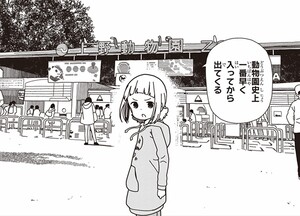After doing with 〜てから
Grammar: Time and Sequence » 〜てから
てから expresses the idea of “after” or “since” in sequencing actions. It connects two verbs or actions, indicating that the second action happens after the first one is completed. It combines a verb the て form with the conjunction から.
This usage differs from て alone by emphasizing that the first action must finish before the second begins. It’s often used for instructions, habits, or timelines.
Examples
Celebrating after touching with 〜てから

Chino doesn’t have much luck with animals other than her rabbit Tippy. However, she’s able to successfully touch the always-still rabbit at Chiya’s family’s cafe.
- リゼ:
- 「ちゃんと触ってから祝ってやれよ」
- “Since you were able to properly touch [the rabbit], we'll celebrate.”
Leaving the zoo quickly after entering with 〜てから

While trying to find something to do, Sacchan and her friends pass by the zoo, which is free for children to enter. Yui asks if Sacchan plans to enter the zoo.
- さっちゃん:
- 「動物園史上一番早く入ってから出てくる」
- “The fastest in zoo history to enter and then leave.”